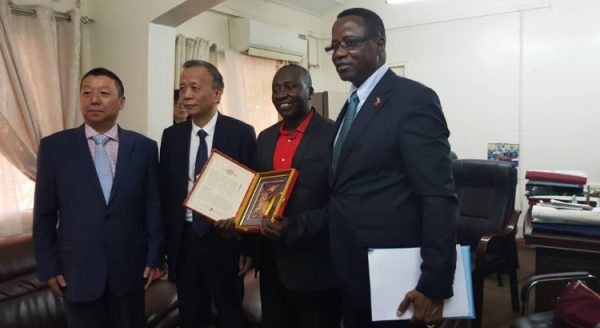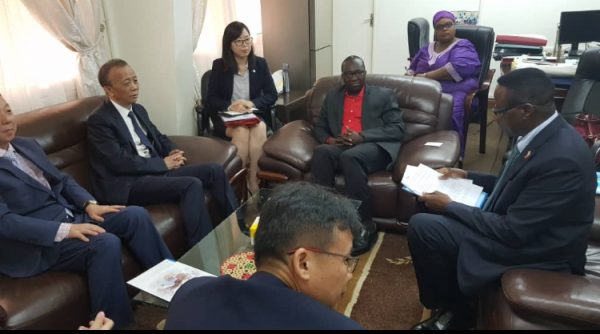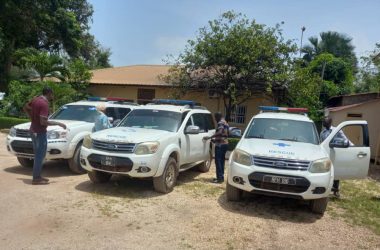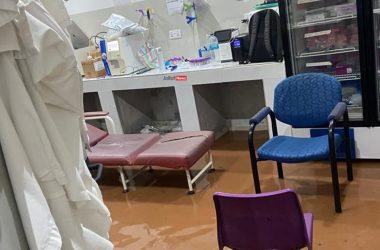 A seven-man delegation from the privately owned Guangdong New South Group Company Limited in Beijing, China, Thursdays arrived in the Gambia to establish cooperation with a view to eradicating malaria in the country.
A seven-man delegation from the privately owned Guangdong New South Group Company Limited in Beijing, China, Thursdays arrived in the Gambia to establish cooperation with a view to eradicating malaria in the country.
The group proposes to launch an anti-malaria programme in the Gambia, which has been tested and widely acclaimed as a success in stopping malaria becoming the killer it is known to be.
As part of the four day visit, the group led by Gambia’s ambassador to China, Faye Ceesay, paid a courtesy call to the Ministry of Foreign Affairs, where they were received by Permanent Secretary Ebrima O. Camara,
In welcoming the delegation, Permanent Secretary Camara underscored the importance of partnership to help address the malaria problem. He expressed hope that the anti-malaria programme if implemented will be a key success for the Government of the Gambia noting that malaria is a killer disease the elimination of which would be a desired outcome
for the Gambia.
 The chairman of the Board of Directors of Guangdong, Zhu Layi, said they intended to eliminate malaria in the Gambia through artemisinin, an anti-malaria medicine that is extracted from sweet wormwood plants that are native to China.
The chairman of the Board of Directors of Guangdong, Zhu Layi, said they intended to eliminate malaria in the Gambia through artemisinin, an anti-malaria medicine that is extracted from sweet wormwood plants that are native to China.
He added that the company is a diversified company engaged in manufacturing traditional Chinese medicine, property development, hotel service, energy development, and financial services with
business across more than 20 cities in the Chinese mainland along with several overseas locations such as Singaphore, Australia, Kenya and Nigeria.
The World Health Organisation (WHO) has recommended artemisinin as effective cure for malaria and the Company has acquired patent protection in 38 countries for its anti-malaria medicines.





If this anti malaria medicine if approved by WHO then go ahead.
Important components of disease management:
• Public Education and awareness
• Mitigation and Control best practices targeting disease vectors
• Access to resources
• Cost of drugs and other interventions
• Skill sets and local capacity
This is a snapshot that’s by no means exhaustive.
Pests, parasites and vectors do evolve in the their response to drugs over time. So the wholesale production of Artemisinin alone will not lead to the eradication of Malaria in The Gambia in the absence of a combined effort at mitigation with other nations in the subregion.
A study on the American effort at eliminating Yellow Fever will yield important lessons for The Gambia.
This discussion must, of necessity, continue if we are to avoid being victims of marketing stunts!
The Gambia has a National Health Policy that specifically discussed control and eradication of malaria on page 22 of the said document. The Chinese drug is designed to treat p.falciparum and will be a welcome addition to our drug regimen.
My advice is to integrate this drug manufacturing and availability as part of a comprehensive approach within the NHP.
Very noble and laudable ambition, and I pray that they succeed, but as always, we must always be wary of foreign entities promising us “heaven on earth” and be ever vigilant that we do not become guinea pigs for new drugs and/or markets for products that may not do what they claim.
We must begin to take matters into our own hands and fight our own battles, whether that’s in malaria eradication, in education, in communication, in food security, in security/defence assurance, etc.
This drug has been in use for 40+ years with excellent track record and side effect profile. It is not new nor is it experimental. Besides Gambia has a very robust regulatory process for drug manufacturing and importation.
Dr Sarr, my worry about policy documents in The Gambia is that once written and adopted, it then goes to collect dust on the shelves. We’re collectively very good at meetings and drafting policy documents which is a good thing. However, when it comes to implementing policies and programs, the energy tends to dissipate from the room.
I agree with embracing Artemisinin and other combination therapies as part of the overall approach to combating P. falciparum but my question is how many in the Gambian healthcare field itself can articulate the regimen?
I see a need for a massive public education campaign to run in tandem with state of art treatment.
Unfortunate but true.
I had conversation with stakeholders in the healthcare sector. I am impressed with the men and women working hard daily to rebuild the system. They are aware, they are smart and they are dedicated.
Problem is, the system is completely fractured. Take EFSTH, it is an eyesore and a cesspool of bacteria due to years of neglect. The staff is capable but demoralized. I won’t practice in that place and will never allow a family member to step foot in that facility for treatment. But most Gambians are left without choice. We are hoping, that choice will be available to all our citizens soon.
We have the roadmap but need help to build infrastructure, train personnel, procure equipment and import medications. Those on the ground are aware and are receiving ongoing training as we speak to understand The President policy objectives in the healthcare sector. Mr Barrow’s goals are aligned with the NHP.